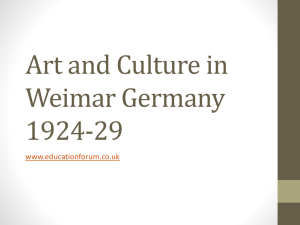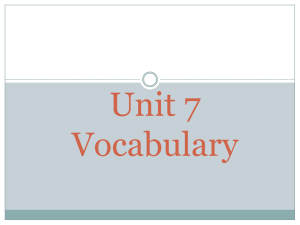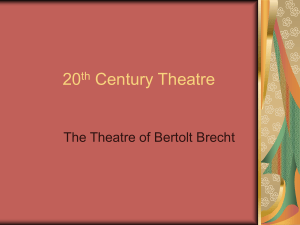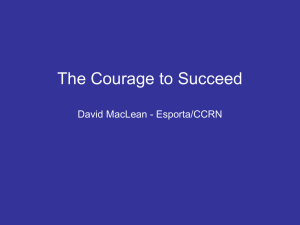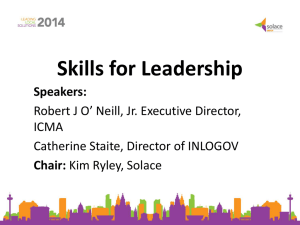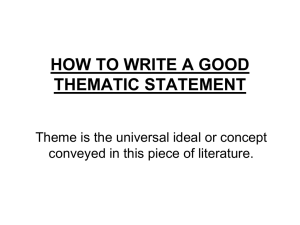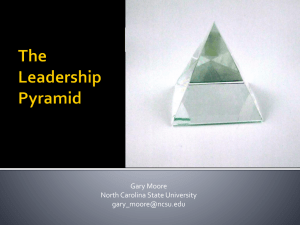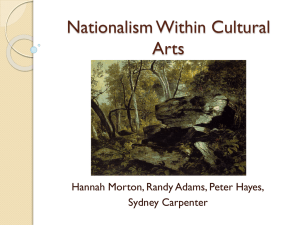Mother Courage and her Children
advertisement
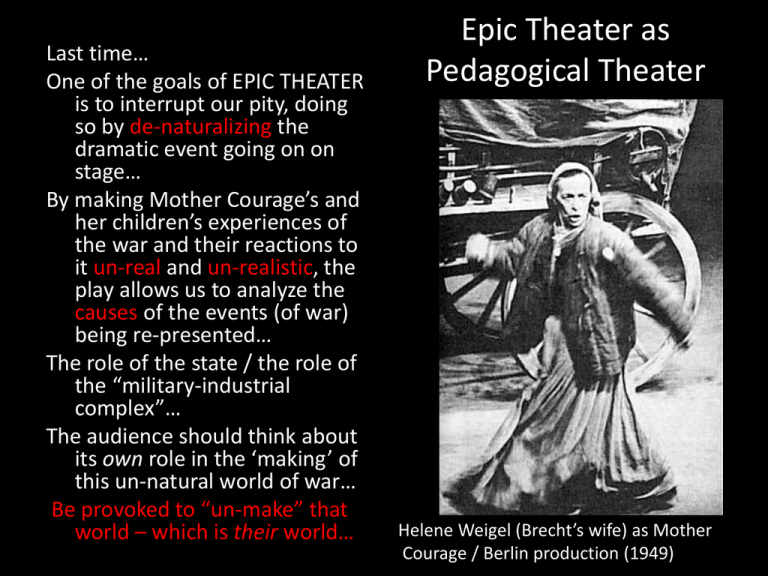
Last time… One of the goals of EPIC THEATER is to interrupt our pity, doing so by de-naturalizing the dramatic event going on on stage… By making Mother Courage’s and her children’s experiences of the war and their reactions to it un-real and un-realistic, the play allows us to analyze the causes of the events (of war) being re-presented… The role of the state / the role of the “military-industrial complex”… The audience should think about its own role in the ‘making’ of this un-natural world of war… Be provoked to “un-make” that world – which is their world… Epic Theater as Pedagogical Theater Helene Weigel (Brecht’s wife) as Mother Courage / Berlin production (1949) The World of the Play: The Audience Should Become a Collective of “Thinking Human Beings”… The audience of the play becomes a collective of “thinking human beings” by thinking about – and “casting [their] vote” (Brecht on Theater, p. 39) – the world in the play and the values of this world… • Think about the material determinants of the world in the play (politics, finance, war)… • And the values such a world produces… • And the reproduction of those values in their world… • “It’s got to stop!” (Brecht on Theater, p. 71) • De-naturalizing / non-dramatic and un-realistic “epic theater” thus distances the audience from what’s going on on stage so that the audience can think about what it is observing and judge it! • It “interrupts” the audience’s immediate relationship to the world in the play so that the audience can take action in its world… One small problem… Epic theater in Translation / Un-realism and 21st-century Cussing Tony Kushner’s English translation contains quite a bit of profanity… Intensified even over Brecht’s profanity… Cussing updated… The Young Soldier (Scene Four, p. 57): In German: “Leck mich am Arsch” Kushner’s version? Brecht’s German Is there a problem with making the language of the play sound more “real” / bringing it closer to us, even “flattening” it out? Isn’t this exactly the opposite of Brecht’s epic theater? Or is this Kushner’s re-presentation of Brecht’s re-presentation of the Thirty Years’ War…for his world! Brecht’s original German is a mix of – Regional, southern German dialect (he was from southern Germany) – Anglicisms (English-derived or based words when there were perfectly good German words to use / “Fakt” for “Tatsache” (“fact”) – Anti-metaphorical speech / concrete images – Bureaucratic jargon Brecht’s “popular style seeks to imitate less the reality than the ‘idea’ of natural speech” and is thus “popular only idealiter” (an illusion of “the people’s” diction) (Mennemeier) The Values of Mother Courage’s / Mother Courage’s World in the play Brecht: “What is a performance “Fatal” Values / Fatal “Virtues”: of Mother Courage and her Children primarily meant to Virtue #1: “Heroism” in Mother Courage show?” / “That war is a and her Children continuation of business by other means, making the human virtues fatal even to those who exercise them.” (Couragemodell, 1949). The General (to Eilif): “You’re a hero…” (“Heldentat,” the act of a hero) Eilif: “You really work up an appetite, butchering peasants” (Scene Two, pp. 20-21) Mother Courage asks the Cook about Eilif: “Any more heroism?” (“Heldentaten,” Scene Eight, p. 84) Eilif Dancing and Singing “The Song About the Solider and his Wife” (Scene Two, p. 25) / Berlin production, 1949 Is this heroism? For Brecht, even this problematic “heroism” is in fact merely boldness … Commentary in the ballads… “The Ballad of the Famous” The Cook: “A lecture in the form of a song, the Song of Solomon, Julius Caesar and other men possessed of a gigantic spirit (“große Geister”), which proved to be of little use” (Scene Nine, pp. 88-91) Solomon / Julius Caesar / Socrates / St. Martin Second stanza “Then Julius Caesar, mighty one, //…So brave (“kühn”) he tore the world apart, // So they voted and changed their Caesar to a God, // Then drove a dagger through his heart, //… So brave, but screaming out in fear he ends. // Brave hearts (“Kühnheit”) are grand! We’re fine with none” (p. 89) “Our virtues led us to our wretched ends. // And folk do better who have none.” (p. 91) No need for any kind of “heroism” when war is a “continuation of business by other means”... Political “business as usual” Mother Courage: “Think the war will end now?” The Chaplain: “There will be brief pauses…But the Emperor or the King or the Pope reliably provides what’s necessary to get it going again. This war’s got no significant worries as far as I can see…” (Scene Six, pp. 62-3) Business “business as usual” Mother Courage: “What else is war but a profit-making competition, / A profit-building enterprise” (Scene Seven, p. 70) Helene Weigel as Mother Courage (Berlin production, 1949) Sidebar: Brecht’s Hidden Inter-Texts and the Politics of Cribbing • “The Ballad of the Famous” • Based on a ballad by the late medieval poet, François Villon (1431-c.1463)… • Villon wrote mostly about men destined for the gallows, indulged in parody and lewd jokes; some of his poems use Parisian thieves' slang. / His verse is mostly about his own life, a life of poverty and run-ins with the authorities… • Good choice by Brecht? / “Small people”? • German translation of Villon by K.L. Ammer (1879-1956) – Des Meisters Werk (1907) • Brecht basically plagiarized Ammer’s work… • Ammer only got royalties after the ‘borrowings’ had been pointed out in reviews.. Woodcut illustration from Le Grand Testament de Maistre François Villon (Paris, 1489) Brecht notoriously used the work of many authors under his own name, most prominently scenes and songs written by his lovers, Elisabeth Hauptmann (1897-1973) and Margarete Steffin (1908-41), without giving them credit… Brecht and Elisabeth Hauptmann Brecht and Margarete Steffin Virtue #2: (Real) Honesty in Mother Courage and her Children Swiss Cheese and the cash box (Scene Three) Mother Courage: “They made you paymaster because you’re honest, you’re not brave like your brother, they like it that you’re too feeble-minded to get your mind around the idea of stealing it.” (p. 28) Swiss Cheese: “It’s the regimental cash box…It’s my responsibility.” (p. 37) The wages of honesty in the world of Mother Courage and her Children – Production Mother Courage and her by the Classical Theater of Harlem (2004) – Children? Mother Courage: “Why should I know him?” (p. 43) Virtue #3: Compassion in Mother Courage and her Children Mother Courage: “You can’t be so kind, Kattrin” (Scene One, p. 16) Stage directions: “Kattrin emerges from the rubble, carrying an infant.” Mother Courage: “Oh what luck, who’s found herself another suckling to haul around? You give it back to its mother onetwo-three before you get Kattrin threatens Mother Courage (Scene Five, attached and I have to spend p. 59) – Cal Poly Pomona production of Mother hours pulling it away, do you Courage and her Children (2006) hear?” (Scene Six, p. 60) Compassion as a viable value in this world? Doubling up the “Fatal Virtues”: Kattrin’s Compassionate Heroism Scene Eleven / The Attack on Halle “The stone begins to speak” (p. 93) The Farmer’s Wife: “Remember her mother, Lord, who’s gone there…and protect my brother-in-law and the four kids my late sister’s left him…save the four kids who never did nothing wrong.” (p. 96) First Soldier: “Listen. It worked. She did it.” (p. 102) Did it “work”? / What are the wages of compassion in the play? Mother Courage and her Children / Berlin production (1949) / Scene Eleven Even in this scene, however, our compassion as spectators… …is interrupted by Brecht via comedy… The Lieutenant (calling up to Kattrin): “You don’t believe him, you aren’t stupid, you know we’re not friends and anyway, who’d trust someone with a face like his?” (p. 99) Look for how Carl Weber describes the additional “comedy” of this scene in the Berlin production of 1949 in the film, “Theater of War”… Epic theater… Brecht: “The scene with the drum [Scene Eleven] particularly stirred the spectators…Members of the audience may identify themselves with dumb Kattrin in this scene; they may get into her skin via empathy and enjoy feeling that they have the same latent strength...” (Couragemodell, 1949) But do they have empathy with Mother Courage in the next scene (Scene Twelve)? “The Lullaby” (p. 102) But Mother Courage has no empathy with “the poor people”… Mother Courage: “Only poor people need courage…but it’s a perverted courage…” (Scene Six, p. 65) Do we empathize with the woman who says this later in Scene Twelve? / Does Brecht allow us to? /“The Lullaby” vs. “I have to get back in business” (pp. 102-3) Virtue #4: Empathy in Mother Courage and her Children Helene Weigel as Mother Courage / Mother Courage and her Children / Berlin production (1949) These “virtues” are “fatal” in the play (sometimes they are not even “virtues”…) – and pointless Is the problem here one of individual virtuous actions? Scene Eleven and Individual Agency in the Play The Farmer’s Son: “Cut my throat. I won’t help you.” (p. 95) The Farmer: “I dunno, maybe if we could…you know, we could hoist one of the tall tree trunks somehow and use one end to sort of shove her off and – “ (p. 98) The Farmer’s Son: “Keep drumming! They’ll kill them all! Drum! Drum! Drum!” (p. 101) Stage Directions: “The First Soldier…clubs him brutally.” (p. 101) Brecht is thus arguing that in a world in which the state and the military-industrial complex are in bed together (so to speak), individual actions are not enough… There must be collective resistance to the conditions that enable war… Or at least this is one of the theses of “Theater of War” (dir. Walter) (2008)… Do you agree that this is Brecht’s message? The Individual’s “Despair”: Mother Courage Caught between an Ethics of Care and a Politics of Self-Interest / Survival Mother Courage: “I don’t care if I’m ruined. At least two of my children survived the war, I saw to that.” (Scene Eight, p. 73) vs. “Peace is finished! The war’s been back on three whole days…Thank God!” (Scene Eight, p. 83) In the play, Brecht leaves her “without any alternative”… (Couragemodell, 1949) She is to be a “warning” / “Courage has learnt nothing.” - (Brecht, Theaterarbeit, 1952) So that the audience can learn EPIC THEATER! Pure Self-Interest: The Cook Yvette: “The nastiest fish ever to wash up on the Flanders shore” (Scene Eight, p. 80) Indeed… The Cook: “[Y]ou can’t bring [Kattrin to Utrecht]…who’d want to look up from supper and see that waiting to clear the table?” (Scene Nine, p. 89) Brecht leaves him alone both on stage and in the world in the end (p. 92)… Meryl Streep as Mother Courage / Kevin Kline as The Cook / Mother Courage and her Children / NYC production (2006) The “conditions of determination” were different for the two different audiences… As they are for all audiences and agents… Zurich, Switzerland (1941) – Swiss neutrality / still during the war Berlin, Germany (1949) / four years after the Battle for Berlin These conditions are both physical and psychological… The Rape(s) of Kattrin / Mother Courage: “No husband for her now” / Scene Six, pp. 68-70 Mass Rape of German Women by Soviet and French Soldiers and U.S. GIs in 1945… Most widespread in Berlin… The women in the 1949 audience would have remembered… Can epic theater always distance the audience from the action? Back to Epic Theater… Does the Audience Always Learn? 1941 / 1949 Berlin, Germany / May, 1945 / Streets around the Reichstag Brecht’s Response to the Audience’s Responses in 1941 (Zurich) / 1950 (Munich) “It sounds from the press notices and spectators’ reports as if the Zurich premiere, while attaining a high artistic level, simply represented a picture of war as a natural disaster, an unavoidable blow of fate…[and] Courage’s business activity, her keenness to get her cut…as ‘perfectly natural’…” - Brecht, Theaterarbeit, 1952) The Munich production appears to have elicited the same response… So, in 1950, Brecht added the line: “I must get back into business” (Scene Twelve, p. 103) to interrupt and denaturalize that audience response… Your / Our Response to Brecht’s Response? • Heartless? Cold? • Yet, his point was that such things should not happen! • Pedagogical theater as an instrument of the greater good, no matter what it takes? Brecht’s Heroism: Surviving the War Surviving the Peace - A committed Socialist, Brecht fled Hitler’s Germany for the U.S. (via Denmark , Sweden, Finland, Moscow) in 1933, arriving in U.S. in 1941… - Brecht then fled the U.S. the day after he is interrogated by the House UnAmerican Activities Committee (HUAC) in 1947 as a suspected Communist sympathizer - The Cold War-era McCarthy Hearings / Hollywood Blacklist hearings / The “Hollywood Ten” refuse to testify…he does / And denies that he was ever a communist… - Brecht returns to Communist East Berlin, East Germany, after 1949, but keeps his Swiss citizenship… - Produces Mother Courage and her Children in 1949 partially to curry favor with the Communist East German government, that was suspicious about his political reliability… Brecht in the post-war U.S. The Intellectual in the Face of Authority / Deceit and Deception / Watching out for himself… Brecht testifying in front of HUAC, 1947 Two Germanies (1945-1989) - East Germany (under Soviet Russian influence) - West Germany (under western European / NATO influence) German - Reunification (1989/90) Brecht as Simplicius in the 1947 Cold War U.S. The HUAC Hearings… Deceit and / or Prudence? Fast forward… Hero or Villain? Bertolt Brecht in Cold War East Berlin, East Germany / Workers’ Uprising (June, 1953) Popular uprising against the East German government because of increased work hours / quotas imposed by the central government under pressure from the Soviet Union 400,000 people demonstrated 150-1,000 casualties (still debated) as a result of the government’s response Brecht publicly supports the crackdown of the regime!!!! Theodor Adorno called the Brecht who moved back to East Germany / East Berlin a “eulogist for complicity” who “championed” not an “imperfect socialism but a tyranny” An intellectual traitor who had abandoned the very workers / “small people” for whom he claimed to speak… Brecht’s Reaction to the Workers’ Uprising, East Berlin, 1953 / Surviving the Post-War Peace… Brecht: "History will pay its respects to the revolutionary impatience of the Socialist Unity Party of Germany. The great discussion [exchange] with the masses about the speed of socialist construction will lead to a viewing and safeguarding of the socialist achievements. At this moment I must assure you of my allegiance to the Socialist Unity Party of Germany.“ - published in East German newspaper, Neues Deutschland (New Germany) 1953 - Still too risky – or too risky again in Germany, as it had been in the U.S. - to say the truth? Or was Brecht merely dedicated to the survival of his theater, the Berliner Ensemble, as an institution of Pedagogical / Epic Theater in the PostWar World that the East German government had allowed him to establish and that it supported… In his defense… Brecht’s later poetic commentary on the uprising… “The Solution” (1953) “After the uprising of the 17th of June The Secretary of the Writers’ Union Had leaflets distributed in the Stalinallee Stating that the people Had forfeited the confidence of the government And could win it back only By redoubled efforts. Would it not be easier In that case for the government To dissolve the people And elect another?” Brecht and Weigel on roof of Berliner Ensemble theater on 1 May, 1954 (International Workers’ Day) In any case: Brecht’s Agency as a “Cultural Worker” in a wartime / post-war world was to re-present the past from a specific point of view… According to Brecht, what are we to remember about the Thirty Years’ War? The “Heroes” “from above” – Field Marshall Tilly’s death and the King Gustavus Adolphus of Sweden’s death (Scenes Six and Eight)? Yes, for the State’s sometimes “invisible” (yet sometimes very visible) but crucial role in the war… But also the war’s enabling conditions on the ground… Mother Courage herself as the “supply train” (Scene Twelve, p. 103) “Hopefully I’ll manage to pull the wagon alone…” “I have to get back into business.” The “military-industrial complex” and the individuals involved in it at every level… Next time Re-Presentation as Politics Re-Presenting the Thirty Years’ War in New York City in 2006… Memory and Agency / Generations of War The Cultural Work of Genre in an Era of War: Plays, Documentaries, and the Essay Film Individual vs. Collective Action in the Face of War
